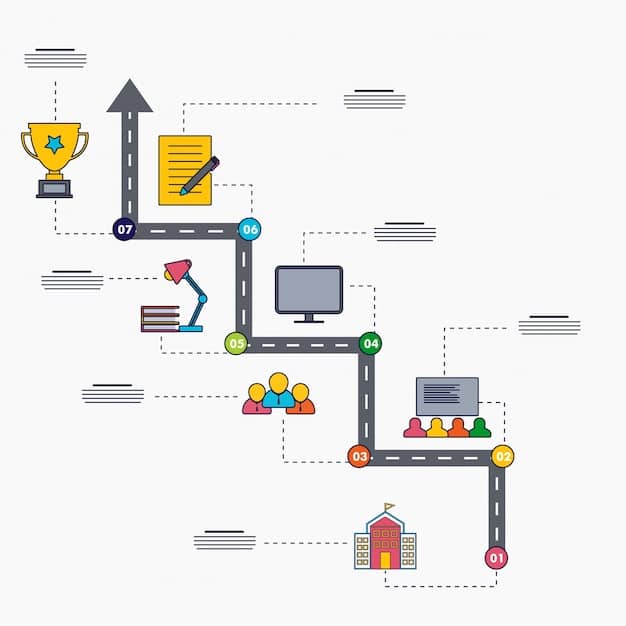Is a Coding Bootcamp Worth It? Data on Job Placement & Salaries for US Students

Is a coding bootcamp worth it? Analyzing job placement rates and salary expectations in the US reveals that while bootcamps offer accelerated career paths, their value hinges on factors like program quality, location, and individual career goals, requiring careful consideration of outcomes versus costs.
Considering a career change into tech? Wondering if a coding bootcamp is the right path for you? This data-driven analysis of job placement rates and salary expectations in the US will help you decide if a coding bootcamp is worth it.
Decoding the Coding Bootcamp Hype: An Introduction
Coding bootcamps promise a fast-track to a tech career, but the reality can be complex. Many prospective students are lured by the promise of high salaries and immediate job placement. However, it’s crucial to sift through the marketing and examine the data to determine if the investment truly pays off.
This article aims to provide an objective analysis of coding bootcamps in the US, focusing on job placement rates and salary expectations, empowering you to make an informed decision.
Evaluating Job Placement Statistics: What the Numbers Say
Job placement rates are a key metric when evaluating the success of a coding bootcamp. But how reliable are these numbers, and what factors influence them?
Many bootcamps proudly advertise high job placement rates. However, it’s essential to understand how these rates are calculated.
Decoding the Fine Print
Job placement rates can be calculated in various ways. Some bootcamps only count graduates who find full-time, relevant jobs within a specific timeframe (e.g., 180 days after graduation). Others might include freelance work, part-time positions, or even jobs outside of the coding field.
Ask bootcamps for detailed reports on their job placement methodology. Understand exactly what criteria they use to define “job placement” and how they track these outcomes.
External Audits and Transparency
Look for bootcamps that conduct third-party audits of their job placement data. Reputable auditing firms will ensure the accuracy and reliability of the reported numbers. Transparency is key.
- Verify Accreditation: Ensure the bootcamp is accredited by a recognized organization.
- Review Alumni Testimonials: Read reviews and connect with alumni to get firsthand accounts of their job search experiences.
- Check Placement Rate Definitions: Understand how the bootcamp defines a successful placement.
Geographic Location’s Impact
Remember that job placement rates can vary significantly depending on the location of the bootcamp. Bootcamps located in tech hubs like San Francisco, New York, or Seattle may have higher placement rates due to the concentration of tech companies in those areas.

Salary Expectations: What Can You Realistically Earn?
High salaries are a major draw for many individuals considering a coding bootcamp. But what can you realistically expect to earn after graduation?
Salary expectations can vary greatly depending on factors such as location, programming language, experience level, and the specific role.
Entry-Level Salaries in Tech
Entry-level salaries for software developers in the US typically range from $60,000 to $90,000 per year. However, this is just a general range. Salaries can be significantly higher in certain cities or for in-demand programming languages.
Research average salaries for specific roles and technologies in your target location. Websites like Glassdoor, Payscale, and Indeed can provide valuable salary data.
The Impact of Bootcamp Quality
The quality of the coding bootcamp itself can also impact salary expectations. Graduates from top-tier bootcamps with strong industry connections and comprehensive curricula may command higher salaries than those from less reputable programs.
Investigate the curriculum, instructors, and career services offered by the bootcamp. A well-structured and industry-relevant program can significantly boost your earning potential.
Negotiating Your Worth
Don’t be afraid to negotiate your salary. Research industry standards and be prepared to justify your desired salary based on your skills, experience, and the value you bring to the company.
- Research Average Salaries: Use platforms like Glassdoor and Salary.com to know your market value.
- Highlight Your Skills: Emphasize projects and technical abilities gained during your bootcamp.
- Practice Interview Skills: Strong communication can significantly impact your negotiation power.
Curriculum and Technologies: Are They Industry-Relevant?
The curriculum and technologies taught at a coding bootcamp are crucial factors that influence job placement rates and salary expectations.
A bootcamp’s curriculum should be aligned with current industry demands. Choosing a bootcamp that teaches in-demand skills is essential for career success.
Popular Programming Languages and Frameworks
Some of the most popular and in-demand programming languages and frameworks include JavaScript (React, Angular, Node.js), Python (Django, Flask), Java (Spring), and .NET (C#). These technologies are widely used in various industries and offer ample job opportunities.
Research the specific technologies taught at the bootcamp and ensure they align with your career goals and the demands of the job market.
Hands-On Projects and Portfolio Development
A good coding bootcamp will emphasize hands-on projects and portfolio development. Building a strong portfolio of projects is essential for showcasing your skills to potential employers. Practical experience trumps theoretical knowledge.
Look for bootcamps that provide opportunities to work on real-world projects and build a diverse portfolio that demonstrates your coding abilities.

Continuous Learning and Adaptability
The tech industry is constantly evolving, so continuous learning and adaptability are essential skills for any software developer. A good coding bootcamp will instill these values and provide resources for graduates to stay up-to-date with the latest technologies.
Seek bootcamps offering post-graduation support or resources to encourage lifelong learning.
Financial Considerations: Tuition, Living Expenses, and ROI
Coding bootcamps require a significant financial investment. Evaluate the costs against potential returns for a clear understanding of your return on investment (ROI).
Tuition costs can range from $10,000 to $20,000 or more, depending on the bootcamp. Consider these costs in conjunction with living expenses during the program.
Exploring Financing Options
Many coding bootcamps offer financing options, such as scholarships, tuition installment plans, and partnerships with lending institutions. Investigate these options to make the program more affordable.
Explore all available financing options, including loans, grants, and scholarships. Understand the terms and conditions of any financing agreements before committing.
Opportunity Cost
Don’t forget to factor in the opportunity cost of attending a coding bootcamp. During the program, you may not be able to work full-time, which can impact your earnings. Plan for this period of reduced income.
Consider the income you might forgo while attending the bootcamp. Create a budget that accounts for living expenses and lost income.
Calculating Your ROI
To determine the ROI of a coding bootcamp, compare the total cost of the program (including tuition, living expenses, and opportunity cost) against your potential future earnings. A higher ROI indicates a better investment.
- Calculate Total Costs: Include tuition, fees, living expenses, and lost income.
- Estimate Future Earnings: Research average salaries for entry-level developers in your target area.
- Compare Costs to Expected Income: Determine if the potential earnings justify the initial investment.
Alternative Educational Paths: Weighing Your Options
Coding bootcamps are not the only path to a tech career. Consider the pros and cons of other options, such as traditional computer science degrees, online courses, and self-study.
A computer science degree typically takes four years to complete and provides a comprehensive theoretical foundation in computer science. Online courses and self-study offer flexibility and affordability, but they require discipline and self-motivation.
Computer Science Degrees
Computer science degrees offer a more in-depth understanding of computer science principles and theories. However, they can also be more time-consuming and expensive than coding bootcamps.
Traditional degrees may offer broader career options beyond specifically coding and development roles.
Online Courses and Self-Study
Online courses and self-study offer flexibility and affordability. Many free or low-cost resources are available online, such as Codecademy, freeCodeCamp, and Coursera. The downside is the lack of structured curriculum and no direct career support.
Assess your learning style and discipline. Online learning requires a strong commitment toward self-direction and finding resources.
Making the Right Decision for You
The best educational path for you depends on your individual circumstances, goals, and learning style. Carefully weigh the pros and cons of each option before making a decision.
Success Stories and Potential Pitfalls: Real-World Outcomes
Looking at real-world outcomes is crucial to evaluating the true worth of coding bootcamps. While many success stories exist, it’s essential to also be aware of potential pitfalls.
Analyzing alumni success stories can provide inspiration and valuable insights into the potential benefits of attending a coding bootcamp. These stories often highlight career transformations, increased salaries, and fulfilling job opportunities.
Recognizing Challenges
Job searching after a coding bootcamp can be challenging. The tech job market is competitive, and graduates may face rejection before landing their dream role. Perseverance and networking are key.
Understand that the job search process may require persistence. Build relationships with other developers, attend industry events, and refine your interviewing skills.
Continuous Learning and Adaptability
Continuous learning and adaptability are essential for long-term success in the tech industry. Graduates who remain committed to learning new skills and adapting to evolving technologies are more likely to thrive in their careers.
Take advantage of online courses, workshops, and conferences to stay up-to-date with the latest trends. A career in tech thrives when you embrace continuous learning.
| Key Point | Brief Description |
|---|---|
| 🎯 Job Placement Rates | Vary by Bootcamp, location, and job definition. Verify definitions. |
| 💰 Salary Expectations | Entry-level typically ranges $60k-$90k, but depends on skills and location. |
| 📚 Curriculum Relevance | Should align with current industry demands (e.g., JavaScript, Python). |
| 💸 Financial ROI | Weigh tuition, living costs, and forgone income against potential earning. |
Frequently Asked Questions
▼
A coding bootcamp is an intensive training program that teaches individuals the skills needed to become software developers. It typically lasts several weeks to a few months and focuses on practical skills.
▼
Some coding bootcamps are accredited, but not all. Accreditation can be a sign of quality, so it’s worth researching. Look for accreditation from recognized organizations.
▼
The prerequisites vary depending on the bootcamp. Some bootcamps require no prior coding experience, while others require some basic programming knowledge. All should require a solid aptitude for abstract thinking.
▼
The duration of a coding bootcamp can range from several weeks to several months. Most full-time bootcamps last between 12 to 24 weeks. Part-time bootcamps tend to last longer.
▼
Many coding bootcamps offer career services, such as resume workshops, mock interviews, and job placement assistance. Some may offer networking events and connections to potential employers.
Conclusion
Ultimately, deciding whether a coding bootcamp is worth it requires careful consideration of individual circumstances, career goals, and financial resources. By thoroughly researching job placement rates, salary expectations, curriculum relevance, and financial implications, prospective students can make an informed decision that aligns with their aspirations and maximizes their potential for success in the tech industry.





